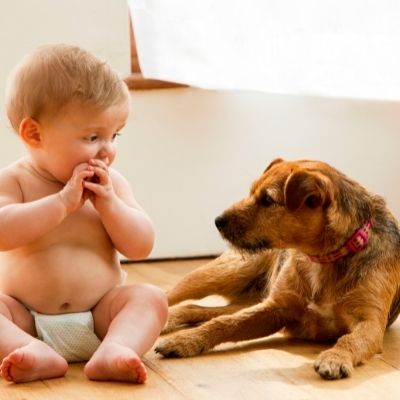It’s the worst dilemma: you bring home your brand new bouncing baby, and your trusty dog who you’ve had for years is suddenly unhappy.
It’s a situation many people face, especially as having a child is one of the largest adjustments you will go through in your life – you are adding a multitude of new smells and noises into your home!
It can upset dynamics with family members and friends, so it’s not a surprise that your pets might be affected too!
However, this is something that is often not thought about during pregnancy, but there are plenty of ways to deal with the situation without having to get rid of your pooch.
Signs your Dog is Jealous of your Baby
Up until now, you have been giving all your attention to your dog, but with the arrival of a new tiny person into the house, your dog might be feeling left out.
Just like humans, dogs have a complex range of emotions and can be quite possessive of their owners (which is often seen as separation anxiety in dogs).
Knowing the signs of jealousy in your dog is important, as many of them can be similar to illness. It is important to determine what is up with your dog, as, if it is sick then it could pass the bug onto you or your baby.
However, there are various signs that show that, rather than needing to call the vet, your dog is just jealous of, or being made anxious of, your tot.

- Aggression – this is one of the scarier behaviors on this list and can cause real problems in your household, especially if this aggression is directed toward your baby.
- Depression – as with humans, dogs can show various signs of depression, especially if some drastic change occurs. Signs of this are a lack of appetite, energy, and interest in toys.
- Pushy behavior – just like in humans, when your dog is feeling a little rejected, it will try to get closer to you physically or get your attention by making more noise. This can be annoying, but it is important to remember that they just need a little reassurance!
- Rejection – on the other hand, your dog may have taken the introduction of a new life a little more personally. They might respond by ignoring you or leaving the room when the baby enters. Although this isn’t as dangerous as aggression, this may be an upsetting behavior for you, and shows that your dog really isn’t happy!
- Behavior changes – no matter how well trained your dog is, a stressful situation such as this may cause strange behaviors such as toileting in the house, overgrowing, or performing tricks unprompted. These are all signs of distress and attention or reassurance seeking and so must not be ignored.
How to teach your Dog to be Calm around your Baby
Some of these behaviors are evidently troubling, so what are the techniques which can be used to make the whole situation better for everyone?
Even before your baby arrives there are various methods you can use to make sure your dog is as calm as possible when the baby finally does arrive. These are methods such:

- Proper socialization – the interactions your dog has when they are a puppy are very influential for the rest of their life. This includes babies. If you have a new puppy and you are planning on having children yourself, try to introduce your puppy to different babies before the age of 12 weeks. Even the sight and smell of a baby can be enough just to reassure your pup that babies are not scary!
- Practice baby – if you are already passed the socialization period, try mimicking the actions you would do with the baby on a doll. This can be as simple as cradling the doll and using creams and diapers, and even rewarding gentle behaviors that your dog shows toward it.
- Flexibility – your baby will become the center of your life once they arrive, so everything else will tend to go out of the window, including your dog’s mealtimes. Try to get your pooch used to this by changing their mealtimes by an hour or two each day, so that when you don’t manage to feed them on time they aren’t so distressed
- Furniture – your home is as much your dog’s as it is yours, so moving furniture around is stressful for them too! Try to make any big adjustments before the baby arrives, so there isn’t too much-added stress for your dog to deal with
However, you might only realize there is a problem once your baby has arrived. In these cases, the following methods are more likely to help you:
- Exercise – physically tiring your dog out will help distract them from the scary baby who lives in your house. Playing with your dog will also boost your mood, and will show your dog some love, meaning they get some more attention
- Desensitisation – try to bring home hospital blankets early so that your dog can get used to the smell of your baby before they arrive. Then, once they are home, gently and slowly introduce your dog to the baby, allowing them to go at their own pace, perhaps increasing the time spent with them each time. Before you know it, your dog will love your baby more than it loves you!
So, there really is no reason to give up your dog when your new baby comes along, as long as you follow these guidelines.
However, if your dog is still responding badly to the appearance of a new family member, consider talking to your veterinarian or dog behaviorist to try to get to the bottom of the problem.
They can help to find the route of the problem, check that it isn’t an illness, and possibly recommend pheromones which will make your home a less stressful place to be!
Rehoming your dog should really only be a last resort, especially as the rehoming centers are already full of bursting! Hopefully, these tips should help make sure your home is a happy one.